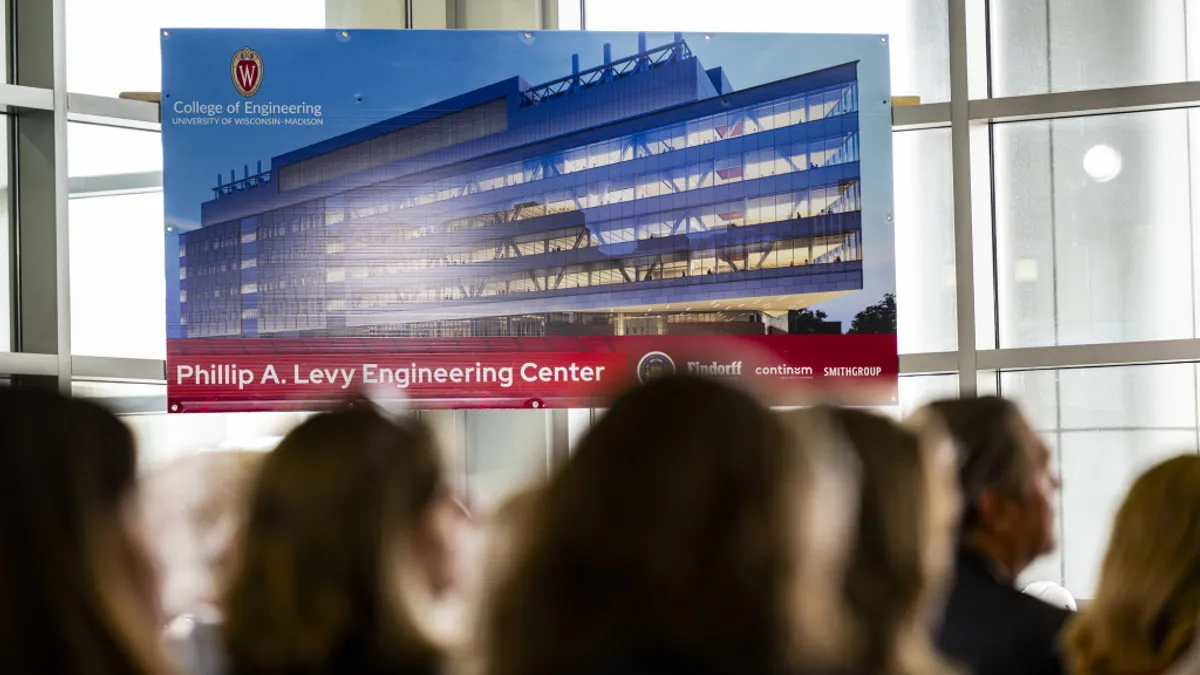This feature is a part of “The Dotted Line” series, which takes an in-depth look at the complex legal landscape of the construction industry. To view the entire series, click here.
Ask ChatGPT to write a design-bid-build contract for a 600-unit, mixed-use project in San Jose, California, and it will spit one out for you.
In response to a prompt from Construction Dive, OpenAI’s generative artificial intelligence bot produced a document that included a scope of work, payment terms, a clause for termination and sections on indemnification, insurance and change orders, among other terms of legal art specific to construction.
So why not just use it on your next project?

“Because 100%, you’re going to get sued,” said Jerry Levine, general counsel at London-based ContractPodAi, whose AI-powered legal assistant known as "Leah" can analyze contracts and flag relevant portions on command. "If somebody is solely relying on AI-generated contracts for a construction project, they're really just asking for trouble."
Since ChatGPT’s debut last November, applying generative AI to routine tasks has captured the imagination of the business world and spurred a new digital arms race in Silicon Valley. Microsoft retooled its Bing search engine with AI functionality, Google introduced its own AI chat service, called Bard, and dozens of other firms have clamored into the space.
However, the new technology has also worried lawmakers and experts, who are calling for regulation and safety checks.
For construction lawyers, AI’s potential lies somewhere in between. It holds great promise as a tool that could offload junior-level tasks of summarizing case law or fact-checking required clauses in contracts. But it also opens a Pandora’s box around client confidentiality, plagiarism, intellectual property and the possibility that no human being ever lays eyes on a contract.

“To some degree, it scares the living daylights out of me,” said Seth Price, a construction attorney at Chamberlain Hrdlicka in Atlanta. “On the other hand, I had a client with a very strong in-house legal department ask ChatGPT for the best defenses to a liquidated damages claim, and it came up with a pretty good list.”
Missing clauses
From that perspective, asking the bot to suggest options for responding to a dispute could be a good use case. But directing AI to create a contract from scratch to build a project valued in the hundreds of millions of dollars, as would be the case for the San Jose mixed-use tower? That’s still a fool’s errand at this point, especially for those lacking a JD degree.
“The risk of an unsophisticated party using something like this is that they won’t know what they don’t know,” Price said.

For example, when asked to analyze the design-bid-build contract ChatGPT generated, Carol Sigmond, a construction attorney with Greenspoon Marder in New York City, noted numerous clauses were absent that would otherwise be standard in a comparable project.
“It looks complete, but it is actually missing a lot of key provisions,” Sigmond said. “It’s enforceable, but there would be lots of disputes on the open issues.”
The contract, for instance, lacked language on special inspections, partial payments for defective work, obligations to pay subcontractors and questions about requests for information and testing work once completed, Sigmond said.
The bot-created contract was also largely silent on risk allocation, including who would be responsible for any escalation in the cost of materials, an issue that has been commonplace on projects since the pandemic.
It’s in that area — risk — that machines are likely still not the best tool for the job, attorneys said.
"AI cannot replace the need for lawyers to analyze and assess risk in construction contracts because risk analysis is highly project-specific,” Sigmond said. “It’s unique to each project.”
What AI’s good for in contracting
However, when humans feed an AI engine highly structured parameters and ask it to summarize or highlight certain areas, the technology performs well, attorneys say.
“This isn’t about using AI to replace lawyers,” Levine said. “It’s about using AI to enhance what lawyers already do.”

For example, Dan Rosenberg, a construction attorney at Much Shelist in Chicago, said the technology has the potential to make the drafting of contracts more efficient. He pointed to an AI engine’s ability to pull up a previous contract and make quick changes for a new document. But that is where the true work begins.
“There's going to be a lot of negotiation over various terms, and that's where the real creativity comes in,” Rosenberg said. “It’s the art of drafting something that reflects the compromise that's reached in the room, and persuading the other side to accept certain conditions.”
Still, Trent Cotney, a construction lawyer at Adams and Reese in Tampa, Florida, said tools like Leah and ChatGPT will undoubtedly cause the role of attorneys to change.

“I think where lawyers come in is almost what I would call ‘business therapy,’” Cotney said. “We won’t necessarily be doing the more mundane tasks of contract review. Instead, we’ll need to provide a more holistic understanding of how those contract provisions could potentially impact the project.”
Humans still need to read contracts
That said, Cotney cautioned against just putting the process of contract review on autopilot, since that could allow opposing attorneys to game AI tools.
“You don’t want to rely solely on AI to flag things for you,” Cotney said. “Because if you do, lawyers like me will get crafty and figure out a way to call indemnification something other than indemnification, without getting caught by the AI.”
Another aspect lawyers called out in ChatGPT’s contract was its page count. The document came in at just under two pages, a length attorneys said was surprisingly short for the scope of the project laid out in the initial prompt.
“I’d expect just the legal terms, before you get into all the exhibits that go along with it, to be somewhere between 60 and 100 pages,” said Rosenberg. He said on a comparable project he was negotiating for a client in Denver, for example, the contract itself was 90 pages long.
Even for a much simpler job, attorneys said you’d rarely see agreements of such brevity.
“For a commercial contract, you’d expect something of more substance,” said Cotney. “On a larger project, it could be 10, 20 or 30 pages.”
ChatGPT’s mea culpa
In ChatGPT’s defense, when queried further about what clauses might be missing from the contract, it generated a long list. It included liquidated damages, dispute resolution and subcontractor management, some of the very clauses Sigmond said were conspicuously absent.
It also was contrite when asked why it didn’t offer up those clauses in the first place.
“I apologize for not including those additional clauses in the contract,” ChatGPT said. “As an AI language model, I strive to provide comprehensive and accurate information, but I may not always cover every possible detail or variation. The contract I generated was a general template.”
It then advised that “when drafting a contract, it's crucial to consult with legal professionals.”
Put another way, you don’t have to take these attorneys’ words for it, ChatGPT will tell you itself: AI still needs a lawyer.
____________________________________________________________
The Dotted Line series is brought to you by AIA Contract Documents®, a recognized leader in design and construction contracts. To learn more about their 200+ contracts, and to access free resources, visit their website here. AIA Contract Documents has no influence over Construction Dive's coverage within the articles, and content does not reflect the views or opinions of The American Institute of Architects, AIA Contract Documents or its employees.






















